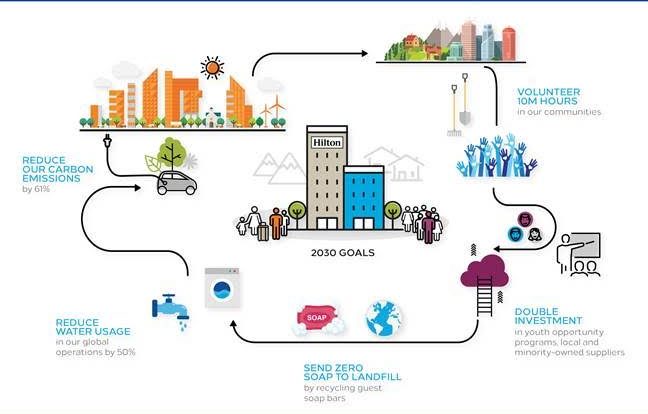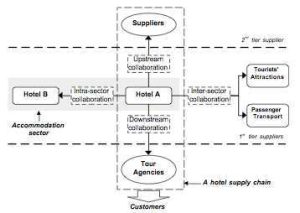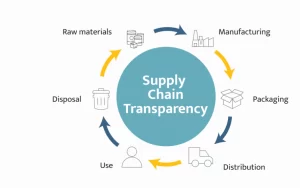As the hospitality industry embraces sustainability and responsible practices, the focus on reverse logistics and recycling initiatives has become increasingly critical. Managing waste efficiently, reducing environmental impact, and adopting circular economy principles are key priorities for hotels, resorts, and restaurants. This article explores the significance of reverse logistics and recycling in the hospitality sector, the benefits they bring to businesses and the environment, and the innovative initiatives undertaken by establishments to promote responsible waste management.
- Understanding Reverse Logistics in Hospitality
Reverse logistics in the hospitality industry refers to the process of handling products and materials after they have been used or consumed. This includes managing product returns, recycling, and repurposing, as well as ensuring that waste is disposed of responsibly.
- The Need for Reverse Logistics and Recycling Initiatives
The hospitality industry generates a significant amount of waste, including food waste, packaging, and discarded items. Adopting reverse logistics and recycling initiatives is essential to minimize the environmental impact of this waste and move towards a more sustainable approach.
- Waste Reduction and Diversion
Reverse logistics and recycling initiatives aim to reduce the amount of waste sent to landfills. Instead, these practices focus on diverting waste through recycling, composting, and repurposing, thus reducing the industry’s carbon footprint.
- Managing Food Waste
Food waste is a major concern in the hospitality industry. Establishments can implement food waste reduction strategies, such as portion control, menu engineering, and food donation programs, to ensure excess food is put to better use.
- Recycling Packaging and Materials
Hospitality businesses can work with suppliers to use recyclable or biodegradable packaging materials. Additionally, implementing efficient recycling programs for paper, glass, plastic, and other materials contributes to waste reduction.
- Repurposing and Upcycling
Repurposing items and materials is an innovative approach to waste reduction. For example, furniture and decor can be upcycled, and items such as towels and linens can be transformed into reusable cleaning rags.
- Composting Organic Waste
Composting organic waste is an effective method of diverting food scraps and other biodegradable materials from landfills. The resulting compost can be used for landscaping or gardening, creating a closed-loop system.
- Collaborating with Waste Management Partners
Hospitality establishments can partner with waste management companies that specialize in sustainable practices, ensuring that waste is handled responsibly and recycled appropriately.
- Educating Staff and Guests
Educating staff and guests about the importance of recycling and waste reduction is essential. By raising awareness and providing clear guidelines, hospitality businesses can encourage everyone to participate in responsible waste management.
- Measuring and Monitoring
Implementing a robust waste management tracking system allows businesses to measure their waste generation, recycling rates, and diversion rates. Regular monitoring enables establishments to set goals and track progress in their sustainability efforts.
- Certifications and Recognition
Achieving waste reduction and recycling goals can be recognized through sustainability certifications and eco-labels. These accolades highlight a business’s commitment to responsible waste management and sustainability.
- Benefits of Reverse Logistics and Recycling Initiatives
a. Environmental Impact: Implementing reverse logistics and recycling initiatives significantly reduces the environmental impact of the hospitality industry, conserving natural resources and reducing greenhouse gas emissions.
b. Cost Savings: Effective waste management strategies often lead to cost savings through reduced waste disposal fees and improved operational efficiency.
c. Brand Reputation: Embracing sustainable practices enhances a hospitality business’s brand reputation, attracting environmentally conscious guests and investors.
d. Circular Economy: By adopting circular economy principles, hospitality establishments contribute to a more sustainable and regenerative economic model.
e. Community Engagement: Responsible waste management initiatives foster community engagement and demonstrate a commitment to local environmental well-being.
Conclusion
Reverse logistics and recycling initiatives are integral components of the hospitality industry’s sustainability journey. By adopting responsible waste management practices, hospitality establishments can minimize their environmental impact, reduce operational costs, and enhance their brand reputation. Embracing recycling, composting, repurposing, and responsible waste disposal contributes to a more circular and sustainable economy, where waste is minimized, and resources are used more efficiently. As the hospitality industry continues to prioritize sustainability and environmental stewardship, reverse logistics and recycling initiatives will remain essential in achieving a greener and more responsible future for the sector.






